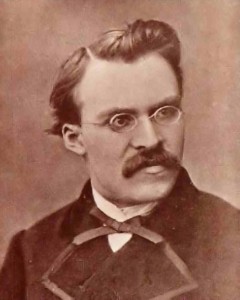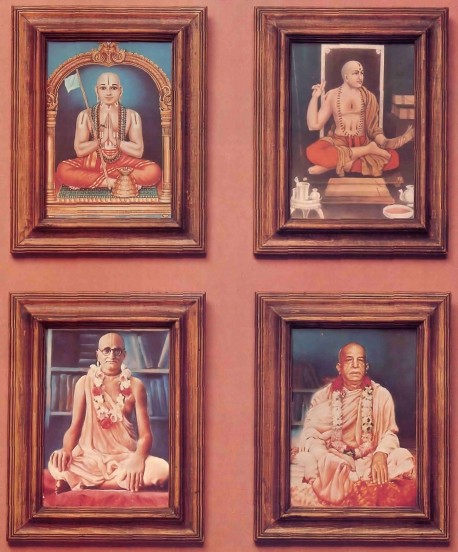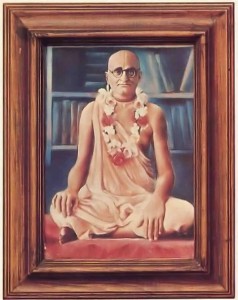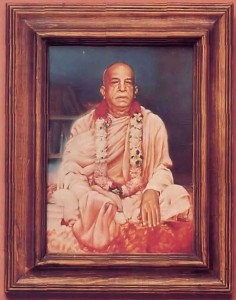 Friedrich Nietzsche thought of the “superman” as someone totally self-controlled, unafraid, simple, aware, self-reliant… and nonexistent. But here His Divine Grace A.C. Bhaktivedanta Swami Prabhupada tells us about real supermen—who they are and how they get that way.
Friedrich Nietzsche thought of the “superman” as someone totally self-controlled, unafraid, simple, aware, self-reliant… and nonexistent. But here His Divine Grace A.C. Bhaktivedanta Swami Prabhupada tells us about real supermen—who they are and how they get that way.
Hayagriva dasa: Friedrich Nietzsche was a German philosopher and poet of the last century who has become very influential in modern philosophy. Schopenhauer spoke of the “blind will” of the individual as being the basic propelling force that keeps the soul tied to material existence, to transmigration from body to body. Nietzsche, on the other hand, spoke of der Wille zur Macht, the “will to power,” which is a different kind of will. This will is not used for subjugating others but for mastering one’s lower self. It is characterized by self-control and an interest in art and philosophy. Most people are envious of others, but it is the duty of the noble man, the philosopher, to transcend this envy by sheer willpower. In Nietzsche’s own words, the philosopher “shakes off with one shrug much vermin that would have buried itself deep in others.” When the philosopher has rid himself of resentment and envy, he can even embrace his enemies with a kind of Christian love.
Srila Prabhupada: This is called spiritual power. Envy is a symptom of conditioned life. In the Srimad-Bhagavatam it is stated that the neophyte who wants to understand the Vedic literatures should not be envious. In this material world, everyone is envious. People are even envious of God and His instructions. Consequently people do not like to accept Krishna’s instructions. Although Krishna is the Supreme Personality of Godhead and is accepted as such by all the acaryas [self-realized teachers], there are nonetheless foolish men called mudhas who either reject Krishna’s instructions or try to screw out some contrary meaning from them. This envy is symptomatic of conditioned souls. Unless we are liberated from conditioned life, we will remain confused under the influence of the external material energy. Until we come to the spiritual platform, there is no possibility of escaping from envy and pride by so-called willpower. A person in the transcendental (brahma-bhuta) stage is described in Bhagavad-gita [18.54] as samah sarvesu bhutesu: He can look at everyone with the same spiritual understanding.
Hayagriva dasa: Nietzsche calls the man who possesses spiritual power the Ubermensch, a word meaning literally “above-man” and often translated as “superman.” The Ubermensch is totally self-controlled, unafraid of death, simple, aware, and self-reliant. He is so powerful that he can change the lives of others simply on contact. Nietzsche never referred to any historical person as the Ubermensch, nor did he consider himself such.
Srila Prabhupada: We accept the guru as the genuine superman because he is worshiped like God. Yasya prasadad bhagavat-prasadah: “By the mercy of the superman one can get in touch with the Supreme Personality of Godhead.” Caitanya Mahaprabhu also accepts this: guru-Krishna-prasade paya bhakti-lata-bija: “By the mercy of Krishna and the guru [the superman, or Ubermensch], one receives information about spiritual life so that he can return home, back to Godhead.” Sri Caitanya Mahaprabhu requested everyone to become gurus, or supermen. The superman distributes transcendental knowledge strictly according to the authorized version he has received from his superior. This is called parampara, the disciplic succession. One superman delivers this supreme knowledge to another superman, and this knowledge was originally delivered by God Himself.
Hayagriva dasa: In Thus Spake Zarathustra, Nietzsche concludes that all men want power. At the top of this hierarchy in the quest for power is the Ubermensch. Thus the Ubermensch would be one who has conquered his passions and attained all good qualifications. His actions are creative, and he does not envy others. He is constantly aware that death is always present, and he is so superior to others that he is almost like God in the world.

Sri Ramunuja (A.D. 1017-1137), Sri Madhva (A .D. 1239-1319), Srila Bhaktisiddhanta Sarasvati Gosvami (1874-1936), and, today, His Divine Grace A. C. Bhaktivedanta Swami Prabhupada
Srila Prabhupada: In Sanskrit the real Ubermensch or superman is called a svami or gosvami, who is described by Rupa Gosvami as one who can control his words, mind, anger, tongue, belly, and genitals. These are the six forces that drive men to commit sinful activities. A gosvami can control these forces, especially the genitals, belly, and tongue, which are very hard to control. Bhaktivinoda Thakura says, tara madhye jihva ati-lobhamaya sudurmati: The force of the tongue is very great, and for its gratification we create many artificial edibles. Nonsensical habits like smoking, drinking, and meat eating have entered society simply due to the urges of the tongue. Actually, there is no need for these things. A person does not die simply because he cannot smoke, eat meat, or drink liquor. Rather, without these indulgences he can elevate himself to the highest platform. It is therefore said that one who can control the tongue can control the urges of the other senses also. One who can control all the senses—beginning with the tongue—is called a gosvami, or, as Nietzsche would say, the Ubermensch. But this is impossible for an ordinary man.
Hayagriva dasa: Nietzsche believed that everyone has a “will to power,” but that the weak seek power vainly. For instance, in his will to power, Hitler sought to subjugate as much of the world as possible, but he was ultimately unsuccessful, and he brought disaster upon himself and Germany. Instead of trying to conquer himself, he attempted to conquer others, and this is the will to power misdirected or misinterpreted.
Srila Prabhupada: Men like Hitler are not able to control the force of anger. A king or national leader has to use anger properly. Narottama dasa Thakura says that we should control our powers and apply them in the proper cases. We may become angry, but our anger must be controlled. For example, although Caitanya Mahaprabhu taught that we should be very submissive—humbler than the grass and more tolerant than a tree-He became angry upon seeing His dear devotee Nityananda Prabhu hurt by Jagai and Madhai. Everything can be properly utilized in the service of Krishna, but not for personal aggrandizement. In the material world, everyone is certainly after power, but the real superman is not after power for himself. He himself is a mendicant, a sannyasi, but he acquires power for the service of the Lord. For instance, I came to America not to acquire material power but to distribute Krishna consciousness. By the grace of Krishna, all facilities have been afforded, and now, from the material point of view, I have become somewhat powerful. But this is not for my personal sense gratification; it is all for spreading Krishna consciousness. The conclusion is that power for Krishna’s service is very valuable, but power for our own sense gratification is condemned.
Hayagriva dasa: Hitler twisted Nietzsche’s philosophy, claiming that he was the Ubermensch, although Nietzsche clearly says that the Ubermensch is not intent on subjugating, others but on subjugating his own passions. Such a superman is beyond good and evil and is not subject to mundane dualities.

Srila Prabhupada: Yes, because the superman acts on behalf of God, he is transcendental. At the beginning of the Bhagavad-gita, Arjuna was thinking like an ordinary person in his reluctance to fight. From the material point of view, nonviolence is a good qualification. Arjuna was excusing his enemies, although they had insulted him and his wife and usurped his kingdom. He pleaded before Krishna that it would be better to let them enjoy his kingdom—”I am not going to fight.” Materially this appeared very laudable, but spiritually it was not, because Krishna wanted him to fight. Finally Arjuna carried out Krishna’s order and fought. Clearly, this kind of fighting was not for personal aggrandizement but for the service of Krishna. So by using his power for the service of the Lord, Arjuna became a superman.
Hayagriva dasa: In his writings on religion, Nietzsche expressed a dislike for the nihilism of the Buddhists and the caste system of the Hindus, especially the Hindu treatment of the untouchables.
Srila Prabhupada: That is a later concoction by the caste Hindus. The true Vedic religion does not speak of untouchables. Caitanya Mahaprabhu Himself demonstrated His system by accepting so-called untouchables like Haridasa Thakura, who was born in a Mohammedan family. Although Haridasa Thakura was not accepted by Hindu society, Caitanya Mahaprabhu personally indicated that he was most exalted. Haridasa Thakura would not enter the temple of Lord Jagannatha because he did not want to create a commotion, but Caitanya Mahaprabhu Himself came to see Haridasa every day. It is a basic principle of the Vedic religion that one should not be envious of anyone. Krishna Himself says in Bhagavad-gita [9.32]:
mam hi partha vyapasritya
ye ‘pi syuh papa-yonayah
striyo vaisyas tatha sudras
te ‘pi yanti param gatim
“O son of Prtha, those who take shelter of Me, though they be of lower birth—women, vaisyas [merchants], as well as sudras [workers]—can approach the supreme destination.” So despite birth in a lower family, if one is a devotee he is eligible to return home, back to Godhead. The sastras [scriptures] do not speak of untouchables. Everyone is eligible to practice Krishna consciousness and return to the Godhead, provided the necessary spiritual qualifications are there.
Hayagriva dasa: Nietzsche believed that by stressing the value of going to the transcendental world, a person would come to resent this world. He therefore personally rejected all formal religions.
Srila Prabhupada: This material world is described as a place of suffering (duhkha-alaya). We do not know whether Nietzsche realized this or not, but if one actually understands the soul, he can realize that this material world is a place of suffering. Being part and parcel of God, the soul has the same qualities possessed by God. God is sac-cid-ananda-vigraha, eternal, full of knowledge and bliss, and the living entities in the spiritual world have the same nature. But in material life their eternality, knowledge, and bliss are absent. It is therefore better that we learn to detest material existence and try to give it up (param drstva nivartate). The Vedas enjoin that we understand the spiritual world and try to return there (tamaso ma jyotir gamaya). The spiritual world is the kingdom of light, and this material world is the kingdom of darkness. The sooner we learn to avoid the world of darkness and return to the kingdom of light, the better it is.
Hayagriva dasa: Nietzsche was greatly influenced by the Greeks, and he was astounded that out of so few men, so many great individuals emerged. He attributed this to their struggling with their evil instincts, and he thought that even today, with the help of favorable measures, great individuals might be reared who would surpass all others. Thus Nietzsche believed that mankind ought to be constantly striving to produce great men—this and nothing else is man’s duty.
Srila Prabhupada: Everyone is trying to be a great man, but one’s greatness is genuine when he becomes God-realized. The word veda means “knowledge,” and a person is great when he is conversant with the lessons of the Vedas. The object of knowledge, as described by Bhagavad-gita, is God or the self. There are different methods for self-realization. However, since every individual is part and parcel of God, if one realizes God, he automatically realizes himself. God is compared to the sun. If the sun is out, we can see everything very clearly. Similarly, in the Vedas it is said, yasmin vijnate sarvam evam vijnatam bhavati: “By understanding God, we understand all other things.” Then we automatically become jolly (brahma-bhutah prasannatma). The word prasannatma means “jolly.” At that time, we can see that everyone is exactly like ourselves (samah sarvesu bhutesu), for everyone is part and parcel of the Supreme Lord. At this point, service of the Lord begins, and we attain the platform of knowledge, bliss, and eternity.
Hayagriva dasa: Nietzsche was emphatic in stating that there has never yet been a superman. He writes, “All too similar are men to each other. Verily, even the greatest I found all too human.” Nor does the superman evolve in the Darwinian sense. Nietzsche thought the Ubermensch a possibility at present if man uses all his spiritual and physical energies. He wrote, “Dead are all the gods; now do we desire the superman to live.” But how is the Ubermensch possible without an object for his spiritual energies?
Srila Prabhupada: We become supermen if we engage in the service of the Supreme Person. The Supreme Being is a person, and the superman is also a person. Nityo nityanam cetanas cetananam: “God is the chief amongst all personalities.” The superman has no other business than carrying out the orders of the Supreme Being. Krishna, or God, wants to make everyone a superman. He therefore orders: Sarva-dharman parityajya mam ekam saranam vraja: “Give up everything and simply surrender to Me” [Bg. 18.66]. If we can understand and follow this instruction, we are supermen. The ordinary man thinks, “I have my independence and can do something myself. Why should I surrender?” However, as soon as he realizes that his only duty is to surrender to Krishna, that he has no other duty in this material world, he becomes the superman. This consciousness is attained after many, many births (bahunam janmanam ante). After many lifetimes, when one actually attains full knowledge of Krishna, he surrenders unto Him. As soon as he surrenders, he becomes the superman.
Hayagriva dasa: Nietzsche would reject dependence on anything exterior to the superman himself. In other words, he would reject “props.” But isn’t it impossible for a man to elevate himself to that platform without depending on the Supreme Lord?

Srila Prabhupada: Of course, and therefore Krishna says, “Depend upon Me.” You have to be dependent, and if you do not depend on Krishna, you have to depend on the dictations of maya, illusion. There are many philosophers and politicians who depend on others or on their own whimsical ideas, but we should depend on the perfect instructions of God. The fact is that every living being is dependent; he cannot be independent. If he voluntarily depends on the instructions of God, he becomes the genuine superman, or Ubermensch.
Hayagriva dasa: Nietzsche’s superman appears to resemble the hatha-yogi, who elevates himself by his own efforts, seemingly independent of God.
Srila Prabhupada: Yes, seemingly. As soon as a hatha-yogi gets some extraordinary mystic powers, he thinks that he has become God. This is another mistake, for no one can become God. A yogi may attain some mystical powers by practice or by the favor of the Lord, but these powers are not sufficient to enable him to become God. There are many who think that through meditation or hatha-yoga it is possible to become equal to God, but this is another illusion, another dictation of maya. Maya is always saying, “Why depend on God? You can become God yourself.”
Hayagriva dasa: Independence seems to be central to Nietzsche’s philosophy. In a sense, his superman is somewhat like Hiranyakasipu, who performed so many penances to gain immortality and who made the demigods tremble to see his austerities.
Srila Prabhupada: Yes, and ultimately he was outwitted by the Supreme Himself. Actually, it is not good to struggle for material power and control over others. If one becomes a devout servant of God, he becomes the superman automatically and acquires many sincere followers. One does not have to undergo severe austerities; everything can be mastered in one stroke.
Hayagriva dasa: And what of sense control?
Srila Prabhupada: If one becomes a devotee of the Supreme Lord, he controls his senses automatically, but he never thinks that he has become God, or the supreme controller.
Hayagriva dasa: One last point on Nietzsche. He believed in what is called eternal recurrence-that is, after this universe has been destroyed, it will be repeated again after many eons.
Srila Prabhupada: In Bhagavad-gita it is stated, bhutva bhutva praliyate: “This material world is created at a certain point, maintained for a certain period, and then destroyed” [Bg. 8.19]. This material world is created for the conditioned soul, who is put here in order to learn his position as the eternal servant of God. Lord Brahma, the first created being in the universe, is given the Vedic instructions, and he distributes them through the disciplic succession, which descends from Brahma to Narada, from Narada to Vyasadeva, from Vyasadeva to Sukadeva Gosvami, and so on. These instructions enjoin the conditioned soul to return home, back to Godhead. If the conditioned soul rejects these instructions, he remains in the material world until it is annihilated. At that time he remains in an unconscious state, just like a child within the womb of his mother. In due course of time his consciousness revives, and he again takes birth. The point is that anyone can take advantage of the Vedic instructions, become a superman or Ubermensch, and go back to Godhead. Unfortunately, the conditioned living entities are so attached to the material world that they repeatedly want to take up material bodies. In this way history actually repeats itself, and there is again creation, maintenance, and destruction.

Leave a Reply